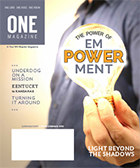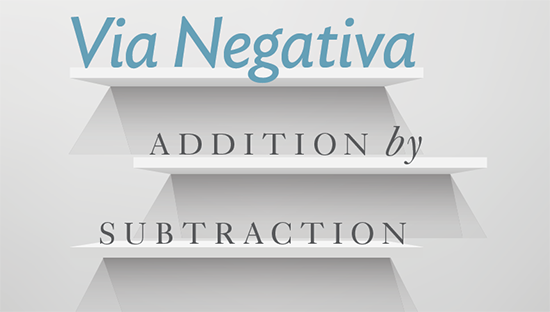
June-July 2017
The Power of
Empowerment
------------------
|






Via Negativa: Addition by Subtraction
By Joshua Eidson
Minimalism. Essentialism. Simplicity. Decluttering.
This is a principle or idea I have been exploring lately. It’s a means to an end, a means to live with contentment; it’s a re-setting of priorities. Western culture, and especially our American wealth, has made us too comfortable, too soft. We have lost our resiliency in tough times. It has distracted us from the important things in life. For me, minimalism has served as a prompt, a needed push to help me reevaluate what a “need” is.
Minimalism is primarily considered a way of thinking towards material belongings, but its core purpose goes much deeper than the material. The principle idea or definition of minimalism is addition by subtraction. Minimalism is discarding all that is unneeded or of lesser value to focus time and energy on those things most important to you. So, in this frame of reference, minimalism can apply to any area of life. And to be fully realized, it must be applied to all areas of one’s life.
Family life is the most rewarding area in which minimalism can apply, but it can also be one of the most contentious or debated areas. First, minimalism is a scale, not a destination or definite point, so it can look different for everyone. Are you constantly running from one calendar engagement to another? From one practice, recital, game, or performance to the next? None of these things are bad, but are they producing the individual and familial results you want? Do they contribute to and reinforce your family’s priorities? Or, are they keeping you from focusing on the family priorities and principles you want to attain? These questions about how we commit our time and family resources help us focus on the most important things in life.
Church life can strongly resemble family life when it comes to minimalism. We can and should use the questions listed earlier when it comes to church resources. The church leadership and congregation should ask these questions of everything in which the local congregation is involved. Each family in the local body of believers should ask these questions as they try to determine where they fit within their local church’s priorities and ministries. If we don’t have focused purpose and principles for our local church, then we have no measuring rod to see if we are effecting the changes we want to see in our church and community.
Personal finances may be the most recognizable application of this principle. It can be a most rewarding area to apply the habit of simplicity. This does not necessarily mean you cut everything from your budget that is not absolutely necessary for existence. Instead, it provides a lens through which to make choices. It clarifies your personal goals, and it determines the means to meet those goals. A minimalistic mindset causes you to ask questions of your current spending habits: if I spend my money here, what goal does it help me reach? If I save money by not dining out, what priority does that give me freedom to pursue?
One of your goals may be to save for your children’s college years. You realize you need to cut back on eating out or entertainment spending by a certain percentage, and reduce your clothing budget to set aside a certain amount for college tuition. Minimalism has helped shift focus from immediate gratification to the more fulfilling perspective of intentional spending.
Minimalism is summed up simply by Joshua Becker, author of The More of Less, “You can do anything you want, but you can’t do everything.” Minimalism is a means to focus on what’s most important and eliminate distractions. It’s not taught me anything new, but it has helped to reshape and reenergize my thinking regarding my priorities. What area(s) in your life could use simplification? Where do you feel you’re missing something greater? Maybe you need to remove the excess so you can identify your true blessings and fulfill your unique purpose.
About the Writer: Joshua Eidson is accounting administrator for the Free Will Baptist Board of Retirement. A native of Middle Tennessee, Joshua graduated from Welch College in 2007, where he earned a B.S. in business administration. He and his wife Rachel have three children.
|
|

